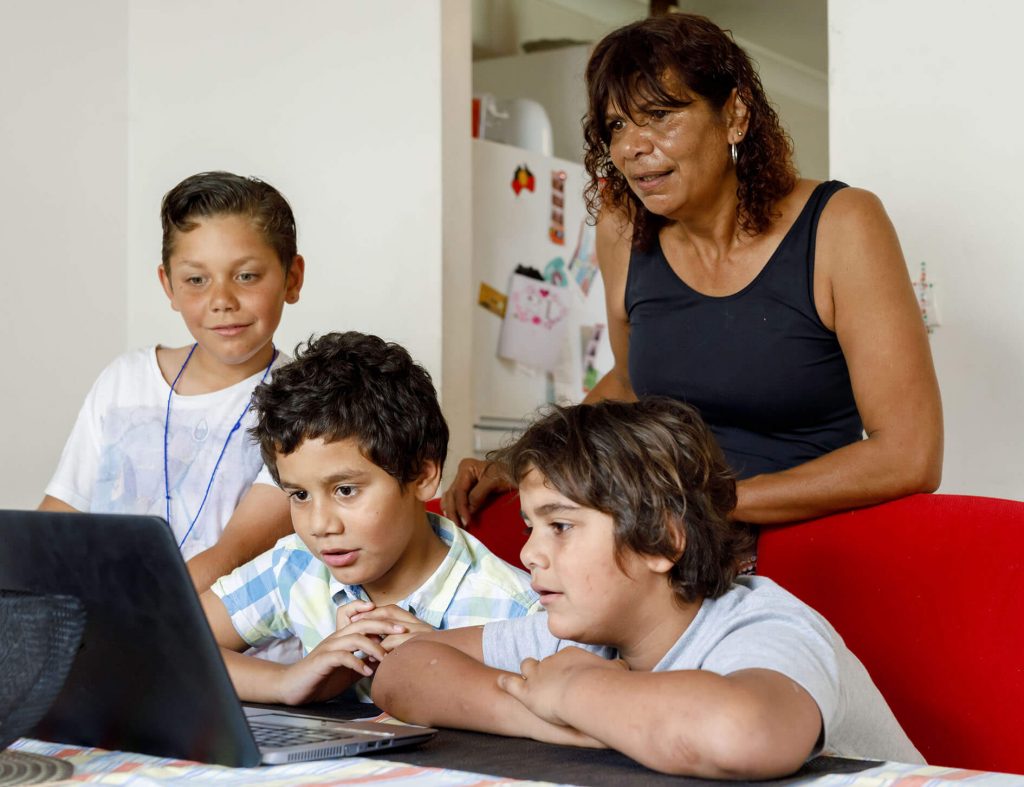This section of Rock Solid talks about:
- Supporting your child’s education journey
- Helping the school understand your child’s needs
- Getting involved at school
- Help for young people in secondary school and beyond
- Your child’s pathway beyond school
- Information for carers of children in out-of-home care
- Key terms explained
It’s the school’s job to educate your child. But they need your help.
Every child has different needs. You know your child best. That’s why the school needs you, to share your knowledge about your child’s needs. In this section, families talk about how they have supported their child’s education journey.
Talking to the school can be real shame. This is sometimes the case for parents and carers who left school early, and who did not have good experiences at school due to racism. Whatever it was like for you at school, you can now help your child to be proud, stand up for their rights, and get the help they need to achieve in their chosen path.
Learn about the language used to talk about special needs
The terms used by schools and support services might be confusing to many parents and carers. Rock Solid uses some of these words too, in explaining how it all works. When we use one of those terms, it is in bold. These words are listed at the end of this section under ‘Key terms explained’ with a short explanation of what they mean.
Supporting your child’s education journey
Every child has the right to the help they need, to learn and take part at school.
Sending your child to school
If your child has special needs, it can be hard to think about sending them off to school. That’s how it was for Stacey, with her little one.
“I thought, ‘How’s he ever going to go to school? He can’t leave me!’ … But once I actually let him go out into the big wide world, I realise it’s not as scary for him – it’s more scary for me. And then once I seen him at school, and to see in the last six months how much he’s progressed … Oh, it’s making me all teary! Seeing how he is now, I’m glad I did it, and sent him to school.” – Stacey
Your child needs your help and support to get to school, and to feel comfortable there. Whatever it was like for you, back when you were at school, you can now give your child a powerful message about how important it is to get their education.
“I can’t read or write, but I know what’s right and wrong. You’ve got to work on kids going to school. What I used to do, I’d take my girls to school and stay there with them. I done that for a fortnight. So they wouldn’t be frightened. They’d mix in with the other kids.” – Uncle Henry
Make sure your child gets the right help
Many children need extra help at school, so they can learn to the best of their ability. Some need a ramp, so they can get into the classroom. Some need to sit up close to the teacher, so they can hear, and focus on their work. Some need the teacher to explain things differently, so they can understand.
Every child has different needs, and you know your child best. That’s why the teacher needs you, to tell them about your child. Both you and the teacher have knowledge that will help your child, as Rodney says.
“Who knows the child more? It’s the mother. So work with both, you know? She can guide the teacher on the child, and the teacher can do it in a professional way, you know?” – Rodney
Reach out in hard times
Like anyone, families that include children with special needs might sometimes have hard times. For example, the family might have very limited funds. There might be changes at home, like parents separating, moving house or a parent losing their job. Or the family might be affected by grief and loss, drug and alcohol issues, family violence or child protection issues.
We acknowledge the role of government and welfare policies, such as those that led to the Stolen Generations, in creating intergenerational trauma and loss that impacts on these experiences for many in community.
Community care is a big part of helping many families get through those times. There are also services out there that can help you, including respite services that can give you a break, or other services that can help you meet the ongoing needs of your child.
Hard times in the family can have a big impact on children with special needs, even if they don’t understand quite what is happening. You can get support to help your children through those times, from community care, from disability services or from school. It can help to let school know what is happening for your child and family, so the school can adjust how it supports your child during those times.
Be proud and support your child’s education journey
Talking to the school can be real shame. This is sometimes the case for parents and carers who left school early, and who did not have good experiences at school due to racism.
Stacey sometimes finds it hard, but she’s deadset to make sure that her children’s schools give them the right help to get their education.
“Be proud of who you are, and don’t let anybody deter you. You know who you are, and where you’re coming from. If this is the right path for you and your child – do it. You want to stand up for yourself, be proud of who you are. Like – I’m a strong black woman, and he’s my baby. You take him, and you learn him like you’re supposed to. And I’ll be watching you! You know? That way.” – Stacey
Rock Solid explains how you can support your child’s education. But you don’t have to do it alone. We also explain what support parents and carers can get, to help you work with the school and support your child.
Helping the school understand your child’s needs
It’s the school’s job to educate your child. But they need your help, to do it the right way.
Make sure your child gets the education you want for them
Schools must give your child the help they need to learn, and support their cultural identity. To do these things, they need your help.
Rodney understands how hard it can be. But he encourages others – especially dads – to get involved at school.
“I know it’s hard. But I had to do it. I had to bring myself to these people, to get the services I’ve got for our son now. I had to go there, talk. And it’s hard, I know, as an Indigenous person, to do all this.
But you have to push yourself. And be assertive. Let them know what you want, and how you want your kid to grow up and learn. And what he or she is comfortable with … To my brothers – man, you’ve gotta bring yourself there. And push yourself. It’s for your kid.” – Rodney
You don’t have to deal with the school alone. You can get help from a support person.
Keep in touch with school
Keeping in touch helps you and the school to be aware of any changes in your child’s life, or the help they need. If things are going well at school, the teacher can let you know. And that helps you feel good about them being there. And if there’s a problem, you and the school can work it out before it becomes a big drama.
Sometimes children need to be away from school, for example if they have hospital stays due to their special needs, or if the family has to travel because of cultural responsibilities. Let the school know when your child is going to be away, and for how long. Then they can plan how to support your child and help them catch up, when they return.
Different ways to keep in touch
You can chat to the staff at drop-off or pick-up time. Some children have a communication book, so you can tell the teacher what’s been happening at home, and they can tell you about your child’s day at school. If this doesn’t work for you, ask about making a regular time to check in, at drop-off or pick-up, or over the phone.
Stacey’s young son has a communication book. She also goes into his school regularly. She finds it a bit intimidating, but she still does it. It’s a bit easier, knowing how much her son loves his young teacher.
“Because I’m older than him, it’s sort of easier for me to approach him. And it seems like he’s a deadly teacher. Like, you can see all the boys in the class, they love him. My boy comes home and tells me what he’s been doing, and tells me, ‘Jamie this’, and ‘Jamie that’.” – Stacey
The school should be having meetings with you once a term, called Student Support Group meetings. Parents and carers might find these meetings hard going. You can get help in meetings, and to work with the school.
Meet and share your knowledge
At these meetings, you can tell the teacher what your child is good at, what they need help with, and what they need to feel comfortable at school. As Suzanna says, you know your own child best.
“We’ve got to work with the teachers. We’ve got to allow them to say what they want to do, and help them along by explaining to them, ‘This is my child’s character … this is who he is, and what his needs are.’
Like, because my son is autistic, he likes routine. If something is not in routine, like a teacher is not there, then of course he’s going to react. You know your child best. You know how they react, and what strategy you use. Like, don’t be afraid to tell them what you do when he gets stressed.” – Suzanna
Communication goes both ways
Suzanna always lets school know, if something happens at home that could affect her son at school.
“I’ll ring them to let them know – ‘Look, his breakfast went out the window this morning because his green t-shirt was not there.’ So they’re aware. If he plays up, there’s always something behind it.” – Suzanna
Suzanna expects the same from the school. And this requires a good relationship between the family and school.
“If something happened at school that they think affected his emotions – then let me know. So then I know what I’m dealing with when he gets home. You need a good relationship with the teachers.” – Suzanna
Getting involved at school
There are many ways to get involved with school. It’s worth finding ways that can work for you, your child and the school.
Ways to get involved include:
- Helping out in the classroom
- Helping out for special events or camps
- Getting involved on school committees or school council
- Staying involved at secondary level
There are many reasons why parents and carers get involved with their child’s school. Sometimes it’s about directly helping out in the classroom or on excursions, in ways that assist their child. Sometimes it’s about getting a stronger sense of their child’s support needs, by being around them in a school environment.
Often parents and carers get involved in order to build their relationship with the teachers and other staff, and the sense of partnership. Having helped out on an excursion or assisted in others ways might stand you in good stead, if and when you need to raise a concern at school, as Marie suggests:
“Some schools invite you in. They consider you a partner, you know? You’ve got to know – and the teachers need to know – that that’s the level you want to work at, too. That you’re all in it together. Everyone’s got the same aim.
I found that I had to show my face, and talk to the teachers. I also went out of my way to try and help, like with extra things at the school, too. To show that I was appreciative that they were helping me as well. The teachers need to support you and do what you want, but you also need to show that you’re willing to support them, when the time comes, as well.” – Marie
Helping out in the classroom
Not every parent or carer is available to help out at school during class time. But for Janet, helping out in her son’s Grade 1 class was helpful for a number of reasons:
“In Grade 1, that was a really important year for Charlie, because it’s not as touchy-feely as Prep. So I decided to help out in the classroom, to learn from the teacher how I could help teach him, and also to see how he was going socially, and see where he was having difficulties.
It gives you a really good understanding of the state of the nation, and where your child is at. That was quite eye-opening for me, to realise what areas he was struggling in, and where he needed help. And he really enjoyed me being there as well. He loved having mum in the classroom. And I thought, ‘You’re not going to enjoy me in Grade 5, so I may as well do it while you’re young!”
Within that, I made some resources for the classroom to help him and some other children that were struggling with things, for instance doing words, adjectives. I developed a good relationship with his teacher. Just being there really helped her and I work on strategies for Charlie together.” – Janet
Helping out for special events or camps
For other parents or carers, it might be more possible to take some leave and help out on school camp or during special events. Anthony felt that this was an important way to communicate to the school:
“Within a matter of weeks at the new school, I took some leave and went on school camp. We make ourselves available at every opportunity to do those types of things.
Not to say, ‘We’ll do all this, so you’ve got to do this back for us’, but you know, we make it clear to them that we’ll do everything we can. It’s not to say, quid pro quo, we’ll give you this if you give us that. It’s about that partnership.” – Anthony
Helping out on excursions or for special activities also provides an opportunity to get to know the teachers a little more, and to build a sense of mutual support and partnership.
“In the specialist setting, you only met twice a year. Except there were always opportunities to visit the school for different things. So I was often at school ‘informally’, which gave me regular opportunities to chat with the teacher.
I also attended class excursions and community activities, so I’d have the opportunity to watch my son interact with staff and other students, and provide suggestions and solutions to any issues I may have observed.” – Rhonda
“I wanted the teachers to know that when there were things that came up at school, like sewing costumes for the production, or helping with wrapping things for the Mother’s Day stall or whatever – that I would try and get involved.
Because not only are you in the school that bit more, and seen that bit more. But you are seen as someone who is trying to support the school, and you are appreciating what the teachers are doing. It works both ways.
It might only be a little thing, like when they would have a particular topic in the class, like the Italian day, for instance, I went and helped them make pasta in the class. It’s just a little thing, but sometimes it goes a long way. It gives the teachers a bit more confidence when they know where you’re coming from.” – Marie
Getting involved on school committees or school council
Some parents and carers are able to get involved with school committees, such as fundraising or Parents and Friends Association committees, or on the School Council. This can be an opportunity to influence the school’s approach in a number of areas that might affect your child’s experience of school.
It can also help to build your relationship with the school staff and leadership, which might sometimes affect how the staff respond to issues you might raise about your child’s education:
“I chose to go on school council. And because they knew that I contributed to the school, and they got to know me, our relationship grew and we gained mutual respect. I think because of my participation with the school, and their knowledge of me, they then responded quite well to most issues that I felt it important to address with them.
Unfortunately, at times I could see there were different relationships between the school and parents who didn’t participate. Which is sad, because if you’re not a contributor to the school you still should be respected.” – Rhonda
Staying involved at secondary level
Parents and carers are often less involved with their child’s secondary school (especially in mainstream) than they were at primary school. However, parents and carers are still valued members of secondary school communities, and there are various ways that you can still contribute and be involved. This helps build your relationship with the school and staff, as well as other families and students; this in turn can help you support your child’s social development.
All schools have School Councils and there may be committees, working bees, or a Parents and Friends Association. Many schools have social functions and fundraisers for families, and parents and carers themselves may organise social events to get to know other families. Consider participating at a level that suits you, your child and family.
Help for young people in secondary school and beyond
Young people’s needs change, as they move into secondary school and beyond.
The change from primary to secondary
Secondary school can be very different from primary school. Instead of one teacher, your child might have six or more. And they have to move between rooms, up to six times a day. There’s a lot to organise, and a lot to take in.
One issue is that each subject period is quite short. So if a young person is having trouble and doesn’t ask for help, the teacher might not pick it up. And many teenagers don’t want to speak up. You need to stay in touch with the school, and let your child know it’s okay to need help. You can also help your child with the move to secondary school.
A different kind of help
Older children might want help to be given in a different way. Some might not want to stick out from the crowd by having a classroom aide. Janine’s older boy was diagnosed with learning difficulties in primary school, where he got aide support. It helped him a lot, but when he got to secondary, he wasn’t too keen.
“He could have had a tutor, or something like an aide come in, but he refused it. He didn’t want that stigma. He knows he needs some help. But he won’t have it in the classroom. If anything, he’d go to the Koorie Educator’s room.” – Janine
Young people shouldn’t be shame about needing help, but their feelings should also be respected. There are many ways to help. You and the teachers can talk with your child helping them in a way that feels comfortable for them.
Looking beyond young people’s behaviour
When young people have their special needs and their culture supported at school, they can focus on learning. When they don’t, some shut down and their needs can get overlooked. Many young people don’t like to speak up, especially if they’re the only Aboriginal student in class.
Other young people get frustrated, or get embarrassed and muck up to take attention away from their special needs. Some teachers will try to find out what’s wrong by talking to you and your child. In other cases, it might be up to you to tell the school why your child needs more help. You can get support to do this.
When assumptions are made
Many teachers work hard to meet the needs of all their students. But sometimes a teacher might have stereotyped ideas about Aboriginal students who are struggling at school. Some might assume a student is getting low marks or mucking up because they don’t want to do the work. They might make comments like, “Kids like you aren’t going to get anywhere in life if you don’t work”.
Sometimes, these experiences might remind parents or carers of bad times they also had at school. For some, it might feel like there’s no point in trying to change things. But your child has rights at school, and you have the right to bring up your concerns. You can get help to do this, from a support person.
Communicating with the school
In primary school your child has just one main teacher each year. In secondary school there are many more teachers who need to know how to help your child. Find the best person to talk to – maybe the year level coordinator or the Wellbeing Coordinator. Other staff can help, like a Koorie Educator. You have the right to ask for just one main person to talk with, so you don’t have to explain things over and over to different staff.
Student Support Group meetings are really important for communicating with the school. The school must make sure information from those meetings gets to all your child’s teachers.
Your child’s pathway beyond school
Later in secondary school, decisions need to be made about what subjects your child will study. Or your child might be offered alternative educational pathways – the school will help coordinate these options.
There are many different programs, including some specifically for Aboriginal young people. Ask the Koorie Educator, the Wellbeing Coordinator or the Career Advisor at school. Or you can ask your local Co-op, or Aboriginal Victoria.
As your child grows up, they can be more involved in making choices for themselves. This teaches them the skills for self-determination.
Your child’s path towards self-determination
Part of the journey of secondary school is helping your child learn to make choices for themselves, and find their own path in life.
Support your child’s voice
When children are little, their parents or carers make most decisions for them, including about school. Although it’s important to listen to children of any age, as Aunty Faye says – especially if they’re having a hard time.
“You’ve got to listen to your child, because him and the teacher might clash. Listen to your child – that’s most important.” – Aunty Faye
Your child might need help to communicate their ideas or feelings. They might learn Auslan or simpler signs. They might use a communication aid or device. Even children who can’t do those things can still get a message across.
As children grow up, they often want more of a say in things that affect them.
“At primary school, the parents and the teacher can see where his weaknesses are. But at high school, it’s good to involve the child. Because then you put the responsibility back on them, by asking, ‘What do you think you’re good at? What do you think you need help with? Not – what are you bad at? But, ‘What do you need help with?’” – Suzanna
Let them set their own goals
As your child grows up, you can get them more involved in planning their education journey. They could come along to their Student Support Group meetings. Or you can talk to them about the goals they want to achieve, and the help they will need to get there.
As Suzanna says, if a child or young person can set their own goals, they feel more motivated to work on them.
“We have meetings where we specifically work on goals for that term. And what strategy we’re going to put in place. But my son is asked, ‘What would you like to achieve this term?’ It’s not something that we put in place. Because with his cooperation, we know what he’s passionate about. Then we work with him, for him to achieve that goal. And it works good. It really works.” – Suzanna
Follow their passions
There are many different ways of learning. Sometimes, one way of learning might not work for your child, and another way might work better. Many children can learn well through doing an activity they enjoy, or learning about a subject they are very interested in.
For Suzanna and Rodney’s son, this was always playing music. Music helped teach their son to speak, to get along with others, and even to do maths.
“You know your child. Whatever the child is interested in, work through that. My son is interested in music. So through music we taught him maths, social skills. Because for him to play a song, he needs to talk to the other musicians, to get results.” – Suzanna
Rodney and Suzanna’s son is in Year 10. This is what he says about his goals in life, and for the next year or two:
“I want to go to TAFE, fix and make up an instrument. And also be in a band. And be in a relationship – get married. And spend my life looking after my family in the future. Later this year, I’m going to get my Ls, and when I’m 18, I’m going to get my Ps, get two cars. And also travel with our band, performing at places around Australia and all that.” – Rodney and Suzanna’s son
Support their self-determination
By involving your child in choices about their education journey, you help them learn the skills for self-determination. It’s about helping your child work out where they want to go, and to speak up about what they need to travel that path. And as Suzanna says, praise them, even if they don’t succeed, and help them learn to keep at it.
“Self-determination is to give the child the responsibility. Let them be passionate about it. Find out what they’re passionate about. If the passion is there in the child, feed that and create the space for them, so they can strive.
Tell them how good they are. And even if they don’t succeed at something, tell them, ‘You tried – that’s great! Maybe try something different. It doesn’t matter, don’t give up. Just try something different.’” – Suzanna
Information for carers of children in out-of-home care
Good communication with school and long-term planning are very important for children in out-of-home care.
Children living in care
More than a thousand Aboriginal children in Victoria live in formal out-of-home care, away from their parents. A majority live with extended family or other Aboriginal families, while others live with non-Aboriginal carers.
Many more children live in informal care arrangements with Elders or other kin. Informal care is where no government department or foster care agency has got involved. Arrangements are made within community.
Care arrangements might last for a short time, occur regularly, or be full-time over many years. Formal care arrangements include foster care and permanent care. Permanent care is more like adoption; permanent carers are their child’s legal guardian, and can make all decisions for them.
Getting help for your foster child
If you’re a foster carer, organising to meet your child’s special needs at school can be complicated.
You can make most day-to-day decisions, but the foster care agency might also be involved. The Department of Families, Fairness and Housing (DFFH) has to sign off many bigger decisions, and give permission for things like medical treatment or out-of-school activities. They also need to cover school fees, uniforms, camps and other costs.
These processes can slow things down – like getting permission for camp, or organising the help your child needs.
Good communication
It helps a lot if you have an open relationship with the school and DFFH. Keep in regular contact, and remind them to pass on any information related to your child.
Keep in touch with the teacher and school staff at drop-off or pick-up, through meetings and your child’s communication book. Keep in touch with DFFH, and let them know if there are things that they need to sign off and when they’re needed, so your child doesn’t miss out, for example on attending excursions or camps.
Planning to help your child
It can take time to get permission for your child to have medical treatment or take part in out-of-school activities like camp. It can also take time to organise funding for extra help or equipment, so you need to plan ahead.
Early each year, talk about what’s coming up in the year ahead. Plan for the help your child will need to attend community cultural events and festivals, school camp, special excursions, swimming or sports. Sometimes, for example, aide or personal care time might have to be saved up, so your child can take part.
The school should have Student Support Group meetings with you at least once a term – more if needed. The foster care agency will usually attend. They might also be able to organise extra support, like sessions with a therapist, to help your child at school. You can also get an outside advocate to help you and come to meetings.
Non-Aboriginal carers
If you are a non-Aboriginal person caring for an Aboriginal child, you should have received training on how to help the child stay in touch with their family, community and culture. You can work with the child’s school, to help support the child’s Aboriginal identity and connection to their culture.
Read other family’s suggestions for how schools can show respect for Aboriginal students’ culture. Also, encourage the school to include Aboriginal and Torres Strait Islander resources and perspectives in their curriculum. Suggest that they invite local Aboriginal Elders or other community members to come and talk at the school.
The Secretariat of Aboriginal and Torres Strait Islander Child Care (SNAICC) has a booklet called ‘Foster their Culture: caring for Aboriginal and Torres Strait Islander children in out-of-home care’. You can download it from their website or order a copy. It includes a section on Aboriginal learning styles and working with preschools and school teachers. The Victorian Aboriginal Child Care Agency (VACCA) can also help with cultural and community matters.
Key terms explained
Alternative educational pathways program
Programs offered toward the end of secondary school, which can lead to TAFE or other training programs. Sometimes these are offered in school, sometimes in community agencies.
Curriculum
What children are taught at school, including the work they are asked they do in class and their homework.
Department of Families, Fairness and Housing (DFFH)
The Victorian government department that helps people with housing, disability and children, youth and family services.
Disability services or organisations
There are many different kinds of disability organisations. Some can help your child with their development by providing therapy or equipment. Others can help you find information, get support or speak up for your child and family.
Koorie Education Worker, Koorie Educator, Koorie Education Staff
A specialist worker, working in a school with children and their families. Schools might choose to employ a Koorie Educator, if they have a number of Aboriginal or Torres Strait Islander students and families in their school community.
Respite, or respite care
Care for a child, young person or adult child with a disability, to give the main carer a break. Respite might be offered by different kinds of organisations, including some Cooperatives, disability services and others. Sometimes you can get funding for respite care.
Special needs
One or more differences between your child and most other children, which affects what they need so they can be well, move around, hear, see, learn, communicate or feel comfortable. Special needs can include disability, chronic illness and mental health issues.
Student Support Group
Regular meetings that the school should have with you, to discuss how your child is going, what help they need at school, how you can help their learning at home, and any concerns that come up.
Wellbeing Coordinator
A school staff member responsible for all students with special needs.
Useful links
Koorie Education Coordinator contact details
Koorie education resources for educators
Victorian Aboriginal Education Association
Victorian Aboriginal Child Care Agency
Deadly Story








